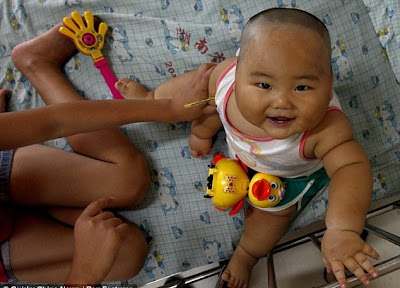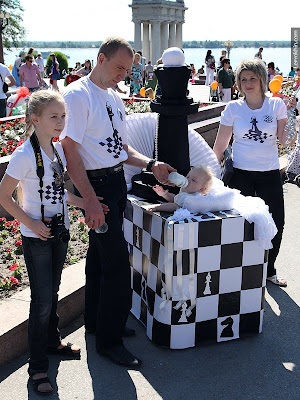Dozing peacefully in her
mother's arms, this is four-day-old Maja Butscher, the first baby to be born as the result of a whole ovary transplant.

Maja, appropriately named after the Roman goddess of fertility, is a symbol of hope to millions of infertile women around the world who could benefit from the same pioneering procedure which enabled her mother Susanne to conceive naturally.
Mrs Butscher, 39, who went through an early menopause, fell pregnant a year after being given an ovary by her identical twin sister.
Recovering from the birth at the Portland Hospital in London, she said: "Being a
mother at last is an indescribable feeling. It's been hard to take my eyes off her since she was born.
"I'm so lucky to have had this wonderful opportunity which has given me a sense of completeness I would never have had otherwise.
"Being the first woman in the world to give birth after a whole ovary
transplant hasn't sunk in yet, but I'm just so grateful to the doctors who enabled this to happen and to my sister, of course.
"I'm happy to be sharing my story with the world to give other women hope who might have similar problems."
Doctors believe the pioneering transplant treatment which Mrs Butscher underwent in the US last year will not only benefit women who suffer an early menopause, but could also help women who undergo chemotherapy or radiotherapy for cancer and who could freeze one of their ovaries before beginning treatment.
Mrs Butscher, whose primary reason for the transplant was to halt the advance of osteoporosis which she was suffering as a result of her early menopause, began ovulating naturally for the first time in her life after receiving the ovary from her sister Dorothee.
She said she feared her transplanted ovary had failed when she missed her period eight months ago.
"It was a little bit worrying, but something inside me told me this was different," she said. "For the first time in my life, I went out and bought a pregnancy testing kit. When it showed up positive, I couldn't believe it, so I went out and bought another one to check."
Mrs Butscher, who is originally from Hamburg but has lived in London for the past six years with her husband Stephan, who is also German, said: "Ever since I found out I was pregnant it has been a magical journey.
"At the same time I was super-nervous. Every time we went over a bump or pothole in the road I was worried."
After a straightforward pregnancy, baby Maja Charlotte Shasa Butscher, whose third name means "precious water", was born by elective caesarean at 2.42 on Tuesday afternoon, weighing 7lbs 15oz.
Doctors at the Portland decided to perform a caesarean because Mrs Butscher had reached full term with no signs that she was about to go into labour.
"When I saw her for the first time I just cried," said Mrs Butscher. "You can't really put into words that feeling when you see your daughter for the first time. I heard her scream first, as she was delivered, and then I saw her. She really is a little miracle."
Mr Butscher, 40, said: "I don't think anyone has invented the right words to describe what it feels like to become a father."
Mrs Butscher, an acupuncturist and complementary therapist, was diagnosed as being infertile 12 years ago following years of tests on her ovaries and hormone levels.
She said: "I never had periods when I was younger, whereas my twin sister had regular periods. I was very slim and the doctors said that when I put weight on my periods would start.
"No-one realised at the time that my ovaries weren't working, they just said my hormone levels weren't normal, so I was put on the Pill to compensate.
"I had all sorts of blood tests, genetic tests, DNA tests, but it wasn't until we moved to Boston in America in 1996 that I was diagnosed with premature ovary failure.
"I was also told I had osteoporosis and that it would be very, very difficult for me to have children. It was hard to take on board."
Mrs Butscher and her husband Stephan, whom she had married that year, discussed the possibilities of egg donation and adoption, but, said Mrs Butscher: "We decided in the end we wouldn't go for any of this. We had a very full life and we were happy. We came to terms with the fact that we wouldn't have children."
Mr Butscher, a management consultant, said: "It was just part of what we were. It was never a massive issue because we had happy lives."
Mrs Butscher was put on hormone replacement therapy but was concerned about the long-term side-effects and began to look for other ways of treating her osteoporosis.
Her gynaecologist suggested she should contact Dr Sherman Silber, who had carried out pioneering ovary transplant procedures at the Infertility Centre of St Louis in Missouri. He suggested she might be a suitable candidate for a whole ovary transplant if her twin sister could be the donor.
"I wanted to make sure it wouldn't harm my sister, because it's such a big thing for someone to donate an organ," said Mrs Butscher. "She said she was happy to go along with it if it was what I wanted.
"At the time my primary concern was to treat my osteoporosis, but at the back of my mind it was also about fertility, even though I had been told so many times I couldn't have children. Dr Silber said it was possible I might start to ovulate, and that was what happened."
Mrs Butscher received her sister's right ovary in a four-and-a-half-hour operation in January 2007.
"It was really emotional because I'm very, very close to my sister and I knew I was the one putting her through this, so it was difficult from a physical point of view and from an emotional one," she said.
"After the surgery there was this tiny flame of hope that I might have a child, but it was difficult trying to balance hope with realistic expectations."
The moment Mrs Butscher had never dared hope for came 13 months after her operation, with confirmation that she was pregnant.
She said: "My husband was away at a conference in Dubai at the time and I didn't want to tell him until I was sure, so I said nothing when I spoke to him that evening and it was only the next day, after it was confirmed by my doctor, that I told him he was going to be a father."
Stephan Butscher said: "I was standing on a platform just about to make a speech in front of 50 people when Susanne rang me and said: 'I have to tell you something.'
"She asked me if I was sitting down, then said 'I'm pregnant.' It was the most fantastic news, and it was difficult to keep the grin off my face as I made my presentation."
Mrs Butscher, who now hopes to have more children, said: "Maja has been absolutely fantastic, she is a good feeder and she sleeps really well. She's got her own personality and she loves to observe everything that's going on around her."
As for her status as a world first, Mr Butscher said of Maja: "She is very calm and relaxed about the whole thing. She's just such a good baby."
 Chubby chops: Lei Lei weighs 20lbs but can just about be lifted up by his mother Cheng Qingyu
Chubby chops: Lei Lei weighs 20lbs but can just about be lifted up by his mother Cheng Qingyu Hungry: Lei Lei, who was a normal weight at birth, loves to eat
Hungry: Lei Lei, who was a normal weight at birth, loves to eat All smiles: Lei Lei is currrently being observed in hospital to see if there is a medical explanation for his size
All smiles: Lei Lei is currrently being observed in hospital to see if there is a medical explanation for his size He's a grower: The portly youngster plays contentedly in his cot
He's a grower: The portly youngster plays contentedly in his cot














 Maja, appropriately named after the Roman goddess of fertility, is a symbol of hope to millions of infertile women around the world who could benefit from the same pioneering procedure which enabled her mother Susanne to conceive naturally.
Maja, appropriately named after the Roman goddess of fertility, is a symbol of hope to millions of infertile women around the world who could benefit from the same pioneering procedure which enabled her mother Susanne to conceive naturally.

 The family of an Indian girl born with two faces, who has been venerated as a "gift from God" by local villagers, will not consult doctors to see if their daughter needs to receive treatment or corrective surgery.
The family of an Indian girl born with two faces, who has been venerated as a "gift from God" by local villagers, will not consult doctors to see if their daughter needs to receive treatment or corrective surgery.



 Although the case was called a hoax by some, a number of doctors over the years have verified it based on biopsies, X rays of the fetal skeleton in utero, and photographs taken by the doctors caring for her. Extreme degrees of precocious puberty in children under 5 are very uncommon but not unheard of. Pregnancy and delivery by a child this young remains extremely rare because extremely precocious puberty is treated to suppress fertility, preserve growth potential, and reduce the social consequences of full sexual development in childhood, and because termination of such pregnancy is more widely available now than in the early 20th century.
Although the case was called a hoax by some, a number of doctors over the years have verified it based on biopsies, X rays of the fetal skeleton in utero, and photographs taken by the doctors caring for her. Extreme degrees of precocious puberty in children under 5 are very uncommon but not unheard of. Pregnancy and delivery by a child this young remains extremely rare because extremely precocious puberty is treated to suppress fertility, preserve growth potential, and reduce the social consequences of full sexual development in childhood, and because termination of such pregnancy is more widely available now than in the early 20th century.